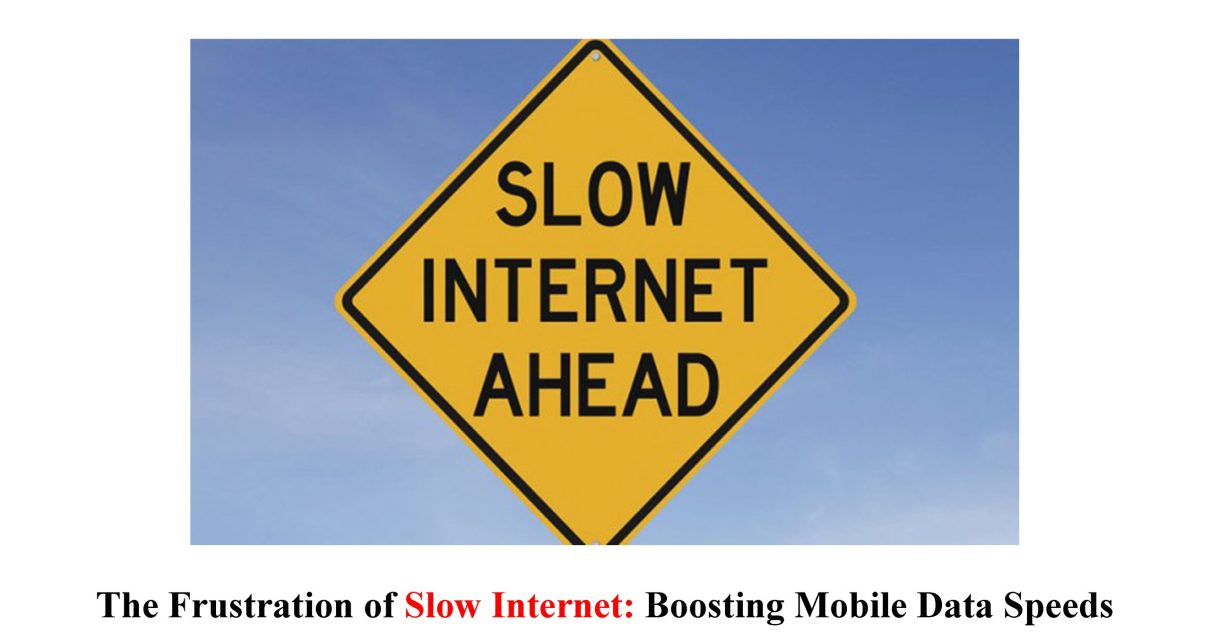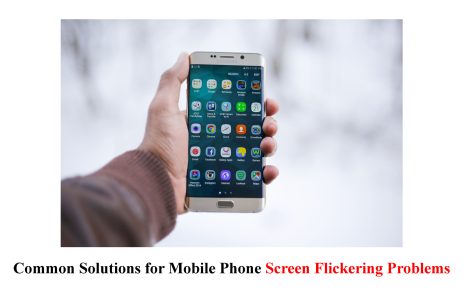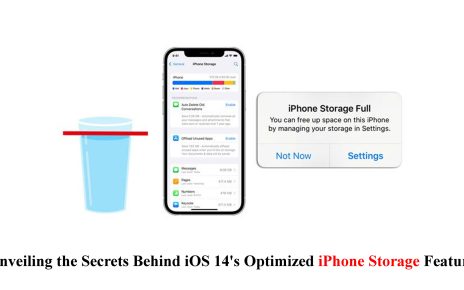Introduction to Slow Internet and its Effects
Do you ever need help with slow internet speeds? We’ve all been there, eagerly waiting for a webpage or a video to buffer. It’s enough to make even the most patient person lose their cool! Slow internet can be more than just an inconvenience; it can have a tangible impact on our productivity, entertainment, and overall user experience. But fear not because in this blog post, we’ll dive into mobile data speeds and explore ways to boost your connection. So please sit back, relax (but not too much), and let’s get ready to supercharge your mobile internet experience!
Understanding Mobile Data Speeds
Mobile data speeds play a crucial role in our daily lives, whether we realize it or not. From browsing the web to streaming videos and using various apps, a slow internet connection can be frustrating and impact productivity. So, let’s dive into understanding mobile data speeds.
What exactly are mobile data speeds? Simply, it refers to the rate at which data is transferred over a cellular network. It determines how quickly you can access information or perform tasks on your smartphone.
Several factors affect mobile data speeds. Network congestion is one of the primary culprits behind sluggish internet connections. During peak hours, when many users access the network simultaneously, speed may suffer as more people compete for limited bandwidth.
Additionally, your proximity to cell towers plays a significant role in determining signal strength and hence affects speed. The farther you are from a building, the weaker your signal may be and, consequently, slower your internet.
The type of technology used by your carrier also impacts mobile data speeds. Older networks like 3G provide slower connections compared to newer 4G LTE or even 5G networks that offer faster download/upload speeds and reduced latency.
Moreover, external factors such as weather conditions or physical obstructions like buildings or trees can weaken signals and result in slower internet connectivity.
To optimize mobile data speeds:
1) Ensure you have a strong signal by staying closer to cell towers whenever possible.
2) Clear the cache regularly on your device to reduce clutter that could slow down performance.
3) Close unused apps running in the background as they consume valuable resources.
4) Limit video streaming quality if you’re experiencing constant buffering.
5) Consider using Wi-Fi whenever available for a faster browsing experience without consuming precious mobile data limits.
In conclusion,
Understanding how mobile data speeds work helps us troubleshoot issues effectively while maximizing our online experience. By considering these tips and being mindful of factors influencing the rate, we can overcome the frustration of slow internet and make the most of our mobile data connection.
Factors that Affect Mobile Data Speeds
When it comes to mobile data speeds, several factors can have a significant impact on the performance of your internet connection. Understanding these factors can help you identify and address potential issues to improve your mobile internet experience.
One factor that affects mobile data speeds is network congestion. During peak hours or in densely populated areas, the increased number of users accessing the same network can lead to slower speeds. This congestion occurs when too many devices are trying to connect and communicate with the same cell tower simultaneously.
Another factor is the distance from the cell tower. The farther away you are from a tower, the weaker your signal will be, resulting in slower speeds. Obstacles like buildings or natural barriers like hills and trees can also interfere with signal strength and decrease data speed.
The type of network technology being used by your device and carrier also plays a role in determining data speeds. Older generations, like 3G, may offer slower connections than newer technologies like 4G LTE or even 5G networks.
Additionally, certain hardware limitations on your device could impact data speed. For example, if you’re using an older smartphone model with outdated components or limited processing power, it might need help to handle faster data transfer rates.
Furthermore, throttling by your service provider is another factor that affects mobile data speeds. Some providers implement measures that intentionally slow down certain types of traffic (such as video streaming) once you’ve reached a specific usage threshold during a billing period.
Environmental conditions such as extreme weather or electromagnetic interference can disrupt wireless signals and negatively affect mobile data speeds momentarily.
Understanding these factors gives you insights into why some locations or times result in slower internet connectivity. By addressing controllable variables like upgrading your device, switching carriers for better coverage options, and avoiding congested areas during peak hours whenever possible – you’ll likely see improvements in mobile data speed performance overall!
Tips for Boosting Mobile Data Speeds
1. Clear Your Cache and Cookies:
One simple yet effective way to improve mobile data speeds is by regularly clearing your cache and cookies. These files can accumulate over time, slowing down your browsing experience. By removing them, you’ll free up space and allow your device to run more efficiently.
2. Limit Background App Refresh:
Background app refresh can consume a significant amount of your mobile data without realizing it. To boost your data speeds, go into the settings on your phone and turn off this feature for apps that don’t require real-time updates.
3. Disable Auto-Downloads:
Auto-downloads can quickly eat up your precious mobile data allowance. Avoid unnecessary downloads by turning off automatic app updates or setting them only to update when connected to Wi-Fi.
4. Use a Data Compression Service:
Some internet service providers offer data compression services that can help reduce the size of web pages before they reach your device, resulting in faster loading times and reduced data usage.
5. Switch Off Background Data Usage:
Certain apps continue to use mobile data even when you’re not actively using them in the foreground. To conserve bandwidth and speed up your connection, go into the settings on your phone and restrict background app activity.
By implementing these tips, you can boost your mobile data speeds and enjoy a faster internet experience!
Alternative Options for Faster Internet
In today’s fast-paced world, slow internet speeds can be a significant source of frustration. Whether trying to stream your favorite TV show, download important files, or browse the web, waiting for pages to load can feel like an eternity. Thankfully, there are alternative options available that can help boost your mobile data speeds and improve your overall internet experience.
One option is to invest in a mobile hotspot device. These devices use cellular networks to provide internet connectivity and can often offer faster speeds than relying solely on your smartphone’s data plan. Mobile hotspots work by creating a Wi-Fi network that you can connect multiple devices simultaneously.
Another alternative is satellite internet. While traditionally associated with rural areas lacking access to other forms of broadband, satellite internet has made significant advancements in recent years. It offers competitive speeds even in urban environments.
For those living in areas with limited coverage or unreliable connections, fixed wireless internet may be an ideal solution. This technology uses radio signals transmitted from nearby towers or antennas directly to your home or business without cables or phone lines.
If you need more than these options, consider upgrading your current data plan with your service provider. Often, they offer higher-tier programs that come with increased data allowances and faster speeds.
By exploring these alternative options for faster internet, you’ll be able to end the frustrations caused by slow connection speeds and enjoy seamless online experiences wherever you go.
Conclusion: Improving Your Mobile Internet Experience
In today’s fast-paced world, slow internet speeds can be incredibly frustrating. Whether trying to stream a video, download important files, or browse the web, waiting for pages to load can feel like an eternity. Thankfully, there are ways to boost your mobile data speeds and enhance your internet experience.
By understanding the factors that affect mobile data speeds and implementing some simple tips and tricks, you can significantly improve your connection. Here are a few key takeaways:
1. Choose the right network provider: Different network providers offer varying levels of coverage and speed. You can research options in your area and choose a reliable service with fast data speeds.
2. Update your device software: Regularly updating your smartphone or tablet’s operating system ensures access to the latest performance enhancements and bug fixes. These updates often include improvements to mobile data connectivity as well.
3. Use Wi-Fi whenever possible: Whenever available, connect to a trusted Wi-Fi network instead of relying solely on cellular data. This will not only help conserve your monthly allowance but also provide faster connection speeds.
4. Clear cache regularly: Over time, cached files can accumulate on your device and slow down its performance, including internet browsing. Clearing this cache regularly helps optimize speed by freeing up storage space.
5. Limit background app activity: Certain apps running in the background may consume valuable bandwidth without you even realizing it. Disable unnecessary notifications or restrict background app refresh settings to prioritize faster data speeds.
6. Adjust video streaming quality: Streaming videos at higher resolutions requires more bandwidth, which could result in slower loading times on slower connections.
You can use lower resolution settings when necessary for a smoother playback experience without buffering delays.
7. Consider using a Virtual Private Network (VPN): In cases where network congestion is high, consider using VPNs, which could route traffic through less crowded servers, resulting in an improved browsing experience.
While these tips can significantly boost your mobile data speeds, it’s important to remember that.



